
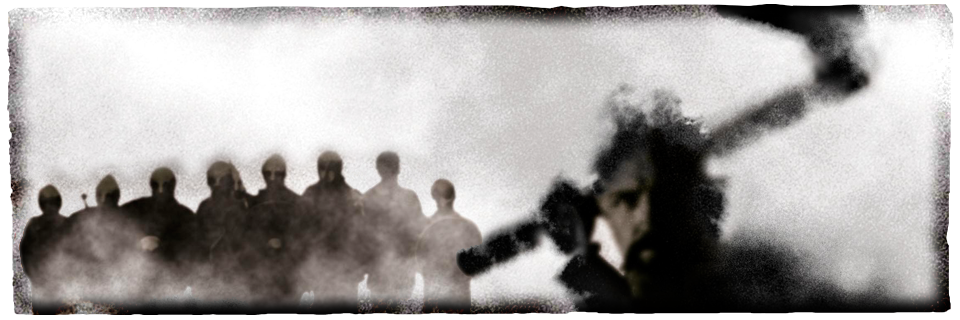 home | about | blog | comments | Border Reivers |Brothers Of The Sand |Kingdom Series | Oathsworn Series
home | about | blog | comments | Border Reivers |Brothers Of The Sand |Kingdom Series | Oathsworn Series
Between right and write
It's hard enough making a living as an author... now planned cuts won't just make it harder to generate cash – it'll make it easier to steal writers' work
16 December 2011
 YOU really shouldn’t consider writing as a career unless you are both thick-skinned and prepared to live on less than minimum wage. There are hundreds upon hundreds of authors out there, more than ever in this digital age of self-publishing and ebooks – but, unless you get lucky, you are never going to make a living at it.
YOU really shouldn’t consider writing as a career unless you are both thick-skinned and prepared to live on less than minimum wage. There are hundreds upon hundreds of authors out there, more than ever in this digital age of self-publishing and ebooks – but, unless you get lucky, you are never going to make a living at it.
The lure of the JK Rowlings and Dan Browns is like that lottery winner from just down the road – if it can happen to them, it can happen to you. And you have as much chance of becoming a Rowling or Brown as you do picking the right lotto numbers. But you aren’t in it for the money, are you? It’s the love of the craft… Mind you, keeping the wolf from the door is always considered A Good Thing and everyone is entitled to some basic cash for their efforts. That’s why we have copyright. Or we did.
The Copyright Licensing Agency (CLA) is the organisation which keeps authors paid for what they do. Within narrow boundaries – private study and non-commercial – copying of articles and books is permitted. Beyond that, you have to pay.
Except that NHS Scotland has decided they don’t want to. They have torn up their agreement with the CLA and, instead, have issued a sort of wagging finger to staff not to transgress the accepted boundaries.
Yeah, as the yoof of today might say, like that's gonna work.
In short, they have agreed to the possibility that NHS staff may pirate work. Given the lack of overwatch, it is almost certainly going to be the case. I understand about public service cutbacks – but doing it at the expense of those who take the time and effort to place their expertise and experience in technical manuals and research books is really kicking their own people in the teeth.
It would simply be a ludicrous example of Scottish Government incompetence... if it wasn’t for the fact that all freelance writers are currently waiting for the UK Government’s proposed changes to copyright law – mostly aimed at increasing the number of ways a writer’s work can be reproduced for free. Of course, it is equally ludicrous to suggest that NHS Scotland’s broadside is the first loud indication of general thinking.
However, there is also the PLR. Public Lending Right is money paid to authors whose books get taken out in libraries nationwide and it is Government money which supposedly compensates for the reduction in sales when your book is able to be read, free, in libraries everywhere. Everyone gets 6.25p per loan, which will be cut to 6.05p come February 2012 (when the payments fall due) under current proposals.
Worse than that is that the admin of PLR has been removed from its efficient little office of a dozen dedicated people in Stockton and handed to the British Library – the ethics of foxes and coops springs to mind at once, not to mention their London living expenses – while the overall budget is being slashed.
I know that authors, same as everyone else, have to suffer the public service cutbacks. I would be more inclined to shoulder the burden of it in falling sales, loss of revenue, increased costs without actually seeing those at the lower end suddenly realising that writing is actually going to COST them money because everyone will grab it, for free, for their own ends.
Robbing people cannot, surely, be a fiscal policy for the future.
But it’s not all doom and gloom. A Bronte manuscript went for £650,000 to a Paris museum, so there is hope for us all. Just get dead for a few centuries and hope the French survive the Euro crisis.
Merry Christmas!
![]()
Horse heads for pigheads
Ancient curses brought back to life help to prove that some attitudes never change – they only become hidden
28 November 2011
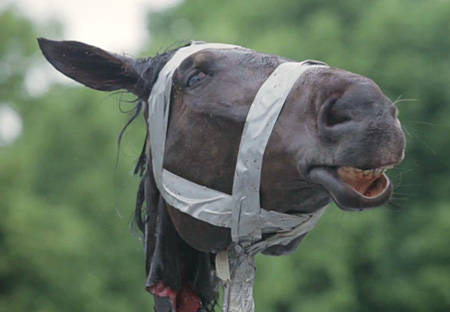 The current legislation regarding the succession laws in the UK now mean that girls are equal to the boys when it comes to getting a throne. Which, though welcome, means little to that stalwart of statistics and vox pops, the person in the street, in an age when women are consistently paid less than men in the workplace.
The current legislation regarding the succession laws in the UK now mean that girls are equal to the boys when it comes to getting a throne. Which, though welcome, means little to that stalwart of statistics and vox pops, the person in the street, in an age when women are consistently paid less than men in the workplace.
However, it has opened a considerable can of fish bait – the Catholic agenda is now howling about equal rights as regards placing a "left footer" on the throne. Can't say I blame them, though I have to raise a warning eyebrow when they start trumpeting about 'historical anachronism' and how irrelevant it is to 21st century thinking.
Er. Naw. For some, the Armada is still just over the horizon. Worse than that, experience has revealed just how thin the veneer of 21st century thinking is. As proof, I hold this up for examination…
In my Oathsworn books, I detail how one of my heroes raises a 'nithing pole' or nidstang against his enemies. It is a pole carved with a curse of runes, topped with a horse head and pointed at the offending parties. I can't claim to be brilliantly inventive – it is detailed in the Icelandic sagas.
Cut to the present day, where a feud between two neighbours in an Icelandic village has led to one being charged with making a threat of murder… due to him sticking up a nithing pole. It isn't the first time it has been used in Iceland – one was raised outside parliament in response to the Kárahnjúkar dam project.
Well, that's Iceland for you. Full of hot air and volcanic ash and in-breds, if you listen to the gossip. But I am indebted to my friend Annis in the HWA for drawing my attention to the forum of Israpundit from August last year. Here, in outrage over comments made by one academic, a nithing-pole was raised to her – complete with natty little graphic – online.
Now if even good Jews can do it then the whole thing is sunk deep in our collective psyche – I wouldn't be in the least surprised to find that's where filmmakers got the idea for the best scene in the Godfather.
The point being that you cannot be rational when discussing faith-based systems, be it pagan, Jewish or Catholic. 'Anachronism' is not a word you can use to denigrate religion.
Nor, it seems, can you be rational and unbigoted regarding the law, if Lord Hope is to be believed. The good Lord has just fired a salvo at the Scottish Parliament and legal system claiming it to be 'corrosively anti-English' in its attempts to subvert the Supreme Court.
I find that bewildering. The Supreme Courts law covers Northern Ireland and Wales, not just England – so how can it be anti-English to have a go at its rulings? As far as I am aware, Scotland has a separate legal system and wants the Supreme Court to stop interfering. Suddenly, that debate is anti-English.
But this is hardly surprising and will become more prevalent and shrieking the closer this country gets to an announcement on devolution; and, of course, is counter-productive to the union cause.
As I keep hammering on: the one thing likely to drive the undecided or even pro-union Scots into the nationalist camp is to keep calling them all bigoted, blind, anti-English fools.
![]()
Sense sets on Empire
Paxman has a new project to sell so harks back to the "glory days" which he claims even Scots should celebrate… despite the obvious lack of any such glory for the "equal partners" in English imperialism
24 October 2011
 He's just been telling the Radio Times how the "dreary educational establishment" has dismissed the Empire as a bad thing, and so it's disappeared from the British curriculum.
He's just been telling the Radio Times how the "dreary educational establishment" has dismissed the Empire as a bad thing, and so it's disappeared from the British curriculum.
He's also been banging on about how the SNP's dream of independence could only have come about because Britain lost said Empire. He accuses the Scots of having once been "ferociously imperialist," joining in with it because it was a "better bet," but having now abandoned Britain because of its waning world power.
Ah, me – Paxman has another book/telly programme to promote. He and David Starkey take turn about launching attacks on the likes of Robert Burns and Scotland in general in that form of shameless self-promotion which argues that any publicity – even that of the mindless tit – is better than none.
So, in the same spirit, I have to agree with The Telegraph, who have leaped enthusiastically all over Paxman's declaration, hailing Jeremy as annunciating what others only think, lest they be considered right-wing buffoons.
The last part I agree with wholeheartedly: Paxman is a complete buffoon.
"It's to the Empire that we owe our sense of ourselves as somehow special," he crows. "Our distrust of continental Europe, the Windsor family's tenancy of Buckingham Palace, the tandoori restaurants and open-all-hours corner shops on our high streets, the high proportion of us who carry passports and much of the international work of British charities… it has even changed the genetic make-up of the British people."
Of course, the essential thing to remember here is that when Paxman speaks of "Britain" or "Empire" he means "England". There are sections of the above panegyric who might not be so stoked about the legacy of the Empire – the Scots have a warm and long-lasting relationship with continental Europe, called the Auld Alliance, while the owners and workers in those tandoori establishments might view the sight of a George Cross with a more jaundiced eye.
And those Scots he claims enthusiastically embraced Empire went out into all the red parts of the old world map not out of a sense of patriotism, but driven to it because English-based landlords preferred sheep to people. As for abandoning it – well, we have been trying for 700 years but it is the lot of the galley slave to be shackled while the captains leave a sinking ship.
If I were Paxman I would consider why it is that only two out of all the major companies trading in Britain pay tax in this country, according to recent reports.
The Scots, he claims, latched on to the Union after almost bankrupting themselves in a crackpot scheme to create an empire of their own – which is an eyebrow-raising view of the Darien Scheme, to put it mildly.
This attempt to establish a trade empire in Panama came about because England dominated other trade routes and shut the Scots out economically. Let's not forget that the original investors in this 'crackpot' scheme had been half and half English and Scots – but the English pulled the plug at the last, leaving Scotland with the whole burden.
The inevitable collapse of it weakened resistance to Union, which is closer to the truth than implying that bankrupted Scots pleaded with their neighbours to save them. Almost every Scot had contributed to the Darien Scheme, large sums and small – but it was only the "parcel of rogues" who sold out to offset their losses. The sma' folk have been paying ever since.
Nor has this chicanery ceased in the 21st century. The original border between the nations was set in 1237 and altered several times, by an England dominant at the time. In July 1999, the Scottish Adjacent Waters Boundaries Order 1999 came into force, which effectively – and sneakily – replaced the then continental shelf boundary based on latitude with one based on 'equidistant principle'. Scotland had only just got a parliament, a year old and still unsteady on its feet, so they missed the implications of it.
They were simple - the coastal waters off Carnoustie and all the oil and gas fields under them are now English. Or British, as Paxman would have it.
The British Empire's influence has always been as a colonial monster, a dominant bully. Once that domination weakened, it is scarcely surprising that all the victims turned on the sagging corpse. I have no regard or sentimental longing for the days of Empire and if it has vanished from the British curriculum it is probably because it is a minefield of possible offence to one or other of the nations now settled here who were once considered lesser peoples.
And the problem with England's identity is that it has always been Imperial. Paxman will never appear in a George Cross t-shirt, or sport a lapel badge, because that flag has been hijacked by the BNP and the EDF and "nationalism" for England is equated with fascism. Which is what the Empire always was.
If Paxman wants to improve the "British curriculum" he should take his buffoonery to one of the last red parts of the map. For his salary, the BBC could probably make a slew of excellent history programmes on Wales, Scotland and Northern Ireland – which were, remember, the "equal partners" in his Empire.
![]()
When culture is toxic knowledge
Scots kids learn about English history in school, but almost nothing about Scots history – but attempts to change that are being labelled as 'brainwashing'...
6 October 2011
 As I have said before: the only way the McDodo Party of Scotland (known, at least currently, as the Scottish Conservatives to some) will ever make any headway is when they start to treat the people of this country as equals. Happily for all those waving blue bunnets and shouting 'Freedom', there appears little sign of this; and much evidence to the contrary.
As I have said before: the only way the McDodo Party of Scotland (known, at least currently, as the Scottish Conservatives to some) will ever make any headway is when they start to treat the people of this country as equals. Happily for all those waving blue bunnets and shouting 'Freedom', there appears little sign of this; and much evidence to the contrary.
The Tories flailing their way through another annual conference, and it seems they are reduced to getting Cameron to demand, in his plummy voice, for His Maj Alex Salmond to come ahead if he thinks he is hard enough. I suspect wee Alex is unlikely to fall in with Tory demands to declare a date on a referendum for independence. He is more likely to pick a time of his choosing, when he can boot the Tories and Labour right up the constitution.
Meanwhile, Annabel Goldie is about to flap off as Tory leader and managed an astonishing swipe at Alex, calling him 'portly'. Pot and kettle, fat bird. Pot and kettle. However, increasingly Annabel is looking like a right loss to the McDodos, since those lining up to replace her are so faceless even the southern Tories can't remember their names.
Now even Labour have plootered into the mire of Scotland with Education spokesman Ken Macintosh sounding decidedly Blue Labour and accusing the SNP of trying to brainwash children with a new Scottish studies course.
Alasdair Allan, SNP MSP, raised concerns that Scots history is being neglected in schools and Labour heartily approved at the time, while the McDodos - as ever - opposed it. Now Labour's Ken Macintosh has told the BBC: "My suspicion is that this is just the SNP trying to brainwash children into their political view."
Ah, right. So teaching English history in schools is enlightening – but Scots will be contaminated by knowing their own heritage. As rampant Anglophobe Samuel Johnson famously said; 'Much may be made of a Scotchman if he is caught young'.
What bollocks. In all my schooldays I learned about the Romans, the Tudors, the Industrial Revolution and both World Wars. None of it was Scottish unless it impinged directly on English history – which, of course, was 'British' then as now. I learned about Hadrian's Wall, but the Antonine one was a passing mention. I learned about Henry VIII and his serial shagging, but not about the Rough Wooing or the sack of Leith. I learned about the rise of Birmingham and Manchester, but not Glasgow as powerhouses of industry unless a ship was mentioned. I did not know there had been a Blitz in Greenock until I was well into my teens and discovered a book in the local library.
In my personal experience, it is gratifying to see primary school weans dipping into the Vikings as a study – but that is all horned helmets and longships, with little to do with the Norse and the heritage left by them in Scotland. Which is understandable in seven year-olds – but it is less understandable to find secondary pupils neither know nor care about the Norse or the Picts, formative peoples of Scotland's history. This is because it has not been any part of exam questions and young adults are hard put to buckle down to study even that narrow band.
It may well change now and, in part, this will be thanks to an untrammeled Scottish government led by portly Alex Salmond. As will the current spiffying up of the Bannockburn center in time for 2014 – the 700th anniversary of the battle.
At the moment, National Trust archaeologists are trying to find the old Roman Road taken by Edward II on to the battlefield, not to mention all the pits and remnants of Bruce's camp. They are having to start by unpeeling the tarmac and I hope that, when they are finished, they can conclusively state that the battlefield is HERE.
Otherwise the rampant developers rather than the rampant lion will rule – and you will have even more tarmac.
![]()
Guiltility we zip along... or do we?
This year's Man Booker shortlisters are selling well – but is anyone actually reading them? And why is it considered a bad thing in some circles if an award-nominated title "zips along"?
23 September 2011
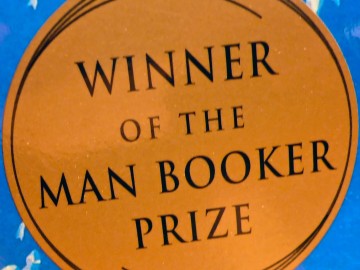 In a well-known Sunday wannabe tabloid, an almost well-known wannabe tabloid journalist had a pop at Stella Rimmer. Since she is the former head of all the tinkers, tailors, soldiers and spies in the UK, this was either very brave or very short-sighted.
In a well-known Sunday wannabe tabloid, an almost well-known wannabe tabloid journalist had a pop at Stella Rimmer. Since she is the former head of all the tinkers, tailors, soldiers and spies in the UK, this was either very brave or very short-sighted.
The thrust of the sneer was that Stella, chairperson for the Man Booker Awards, had announced that she wanted people to buy the books... and read them. Cue pretendy outrage, curled lip and sneers of incredulity. What else would folk do with them – loft insulation?
Well, actually, yes. The only reason people actually buy Man Booker shortlisted books is because they are shortlisted for the Man Booker. They may even read them, but I suspect they will be left prominently on the glass-topped coffee table. Otherwise they would. sadly, be the first and final novel of some aspiring writer, bought by his mum and significant other, a few family members and no-one else.
Similarly, Man Booker judge Chris Mullin, ex-MP, was roundly scathed for daring to suggest that his choice "had to zip along". Cue more outrage. Joyce does not "zip along". Henry James does not "zip along", fulminates our journo. Both statements of uncontestable fact – which is why, of course, both writers are unread for pleasure and largely unpurchased by the majority of the remaining book-buying public. Who, in these straitened times and seeking more escape than enlightenment, will choose their last few 3-for-2 deals on a rollicking good paperbacks that "zip along".
The fact is that books have not been the preserve of the Chosen Few for a long, long time; and so-called literary fiction is appreciated by possibly the smallest demographic known. It is only bought by slightly more when it is stamped with that Man Booker sticker and, of those, only read by ones who do not profess to prefer the "wired varsity to yooni, which is so common ai think".
The "zip along" book is what keeps publishing alive. Nor does that mean, as this piece of appallingly elitist pomposity suggests, that it is any less of a well-written, well-researched work.
Another similarly-afflicted journalist wrote recently in the Telegraph about how historical fiction is "a guilty pleasure". Since I write it, there is no guilt this end – nor do any of the readers of it that I know look furtive and meet me on a street corner to see what hardcover I can slip them for a tenner.
The thrust of it, of course, is that "zip along" fiction in general is somehow equated with a visit to Ann Summers for those who profess a literary bent – a dirty little secret best not revealed to one's peers lest you are banned from the soiree.
There are cases when it is better take one corner of your journalist lip and zip it along, before it reveals your astounding snobbery.
Union blues
I'm not committed to Scottish independence – but I'm becoming convinced that only two things could stop it happening now
12 September 2011
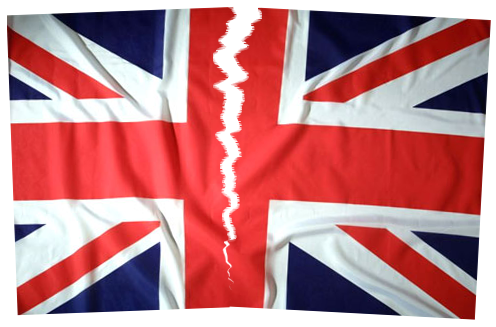 History repeats itself No.147… Researching the final book in my Kingdom series finds me hip-deep in 1314 and looking at the aftermath. Bannockburn is a victory and Scotland, if I might paraphrase Maggie Thatcher, rejoices, but the realisation is slowly dawning on King Robert that he has, in fact, won slightly more than bugger all.
History repeats itself No.147… Researching the final book in my Kingdom series finds me hip-deep in 1314 and looking at the aftermath. Bannockburn is a victory and Scotland, if I might paraphrase Maggie Thatcher, rejoices, but the realisation is slowly dawning on King Robert that he has, in fact, won slightly more than bugger all.
He is firmly-established as king, certainly, but the Enemy has only been slapped out of the country – there is a long way to go and a lot of negotiating to be done before the English are forced to accept that they have a northern neighbour who is their equal and needs to be treated as such.
Leap forward to now, three years before the 700th anniversary of Bannockburn – and Scotland is in the same dilemma.
I am no flag-waving patriot, so if even I can see that the unionist argument is weak, blustering and financially flawed, then all the blue-bonnet brigade will be leaping on tables and shouting Wallace slogans.
Say what you like about Salmond – and he must be the only fish to throw out his own gaffes – he has a surer feel for the relationship between the two nations being based on equality than anyone else in the country. And until Cameron, Clegg and the rest finally realise that the solution to the West Lothian Question is simple – Scottish independence – and that pronouncements from the Scottish Secretary only fuel the fire – because that role is read as one of ‘governor’ in the north, with all the Cressingham connotations that conjures up – then independence will roll inexorably on.
It does not help that flag-waving English patriots are fulminating against what they see as the outrage of charging English students for education in Scotland, or that education and the NHS in England is imploding where, north of the border, it seems to be all shiny, happy and smiley.
I say "seems to be" – but that might well be the Presbyterian in me.
It seems that the unionist supporters shoot themselves in the foot every time because they fail to realise the one truth in all of those – that the union is not and never has been based on equality. I am not committed to full Scottish independence – there are too many unanswered questions surrounding it – but I am becoming more convinced that only two things might derail it.
One is that the unionists finally work out where they are going wrong. The second is that the blue-bonnets shrieking ‘Freedom’ and painting their faces blue, might pour from under the stones and slather their rabid racism all over the quiet majority and turn them from the path.
Country fit for wins
It's understandable we might not want to celebrate battles lost by Scots on Scottish territory – but events including Wallace's defeat at Falkirk need to be marked… don't they?
14 August 2011
 I see Historic Scotland took two rounds of deliberation before including Stirling Bridge on their Inventory of Historic Battlefields. I am not sure exactly what the Inventory does, but the fact that Historic Scotland is the militant arm of the Scottish Government when it comes to safeguarding the nation's treasures means that such inclusion at least guarantees recognition and a brighter spotlight.
I see Historic Scotland took two rounds of deliberation before including Stirling Bridge on their Inventory of Historic Battlefields. I am not sure exactly what the Inventory does, but the fact that Historic Scotland is the militant arm of the Scottish Government when it comes to safeguarding the nation's treasures means that such inclusion at least guarantees recognition and a brighter spotlight.
Bannockburn, of course, sailed through the first tranche waving a saltire – it is getting a spiffy new heritage centre and this latest recognition might put a stop to the creeping developers – at least until after 2014, the 700th anniversary.
Stranger, though, are the other entries on the round two list.
The Battle of Barra (1308) at Inverurie was a Bruce v Comyn affair, when the former rose from his sickbed to rout his long-time rivals and finally stamp Bruce authority on Scotland. Victory for the Hero King.
The Battle of Linlithgow Bridge (1526) is another internecine struggle between the Douglases, self-styled guardians of King James V, and the monarch's mum, who was trying to release him. Victory for the Scots; although it would have been, either way.
Battles at Carbisdale, Cromdale, Inverlochy, Mulroy, Drumclog and Rullion Green are all 17th century affairs when Scot fought Scot, for power or religion. All very worthy, as are the 17 in the original round and all Scottish victories, no matter who won.
But conspicuous by their absence are battles fought primarily against the English – which we lost. Falkirk is in the frame, but only the 1746 version, last triumph of the Jacobites. The 1298 Falkirk where Wallace (pictured) met Edward I and was roundly defeated is not – and yet that, arguably, is at least as important, if not more so, than the 1746 event.
Another absentee is Methven, the 1304 battle between Bruce and the English forces commanded by Aymer de Valence. Once, as a re-enactor, I took part in a recreation of that affair, invited by the good folk of Methven who wanted to celebrate their local heritage.
The action was duly restaged as historically as we could make it – the treacherous English breaking a truce; the bold, brave Scots fighting to the bitter end before fleeing; Bruce almost unhorsed and captured and having to leg it for all he was worth.
At the end of it the came no applause; only a deafening, tumbleweed silence. We had to quickly announce a refight 'to see if we could change history'. This time, of course, the Scots won – cue applause.
It seems even the good folk of Methven had not realised their battle had been a resounding Scottish defeat. And it seems they never will if Historic Scotland are left to it.
I suppose winners are easier to market to foreign tourists than losers.
But here's to the gallant fields of Scottish fallen, which seem destined to be stained with losing for all eternity.
![]()
Marking the foosteps of Bruce
A new visitor centre will protect the memory of Bannockburn… but as its 700th anniversary approaches, shouldn't we protect the battlefield itself?
27 July 2011
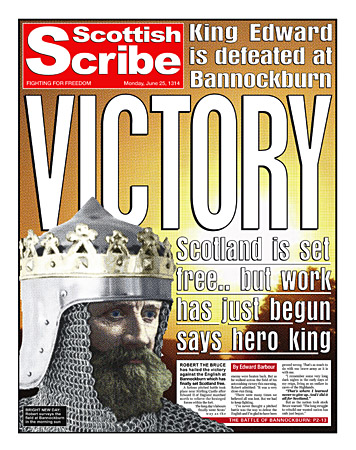 At last, some good news for Scottish history: £4m is to be spent on the Battle of Bannockburn visitor centre. It is just what Scotland's tourist industry needs – but it would be nicer still if there was something for visitors to walk on once they have enjoyed the centre.
At last, some good news for Scottish history: £4m is to be spent on the Battle of Bannockburn visitor centre. It is just what Scotland's tourist industry needs – but it would be nicer still if there was something for visitors to walk on once they have enjoyed the centre.
Unlikely, if the present cavalier developers continue. Housing estates are creeping over Coxet Hill and the Pelstream and the estate agent is now more of a menace than Proud Edward ever was.
The problem is, of course, that no-one can agree on where the battlefield is; and until Time Team or History Cold Case scoop a trench and make a definitive pronouncement, there is now way to stop some enterprising tosser snapping up more green fields of Bannockburn.
Time, of course, for the government to step in and decree. You would think the SNP, being the power in the land, would be sensible about the business – after all, 2014 is the 700th anniversary, the Commonwealth Games, the next Year of Homecoming. But Bannockburn is one of those emotive words and places. Vital in the formative years of the SNP, the annual Bannockburn Rally is now a memory and 'modern' Scot Nats back away from any rampant flag-waving, back-pedalling furiously at any overt attempts to push independence, waving off the Jacobite Tendency with frantic imprecations to 'weesht'. The closer they get to achieving it, ironically, the more nervous they become about proclaiming it.
Even so, the Auld Alliance partner, France, should serve as a role model for how to embrace your history. A great wash of local government, national government and voluntary partnerships in France turn their historic centres into properly funded, properly-staffed tourist attractions which, even if a bit Disney and kitsch, at least keep it alive.
Here, there are no plans I know of to even revitalise the re-enactment of Bannockburn, let alone develop a proper Scottish medieval historical narrative. Perhaps the SNP, judging by its 'independence makes us more British' claims recently, is attempting to embrace Sir Walter Scott more than King Robert Bruce.
It's time the likes of Bothwell Castle was raised up a tourist level or two, so that they go further than Edinburgh or Stirling. Or do to Roxburgh, that wee gem of a castle, what they recently did to Stirling. Or any of the places in Ayrshire, which had as much to do with Bruce as Robert Burns.
And how many Weegies even know that we have one of only two extant medieval cathedrals on the Scottish mainland, far less the resting place of Robert Wishart, Bishop of Glasgow, the kingmaker in the story of both Wallace and Bruce?
Never mind the money – show me the history.
 The newspaper front page you see with this article is taken from an inspired new book, Old The Front Page, written by Martin Kielty. He has invented the Scottish Scribe, a fictional tabloid which has been covering Scottish news since Roman times, and the book presents dozens of front pages featuring the likes of Bonnie Prince Charlie, Mary Queen of Scots, Burns, Scott and many more. I was delighted to write the foreword in which I said: "Old The Front Page is a stunning idea: funny, sometimes irreverent, but always thought-provoking and endlessly creative." Find out more, including details of a pre-order free gift, at http://www.martinkielty.com. You will not regret it.
The newspaper front page you see with this article is taken from an inspired new book, Old The Front Page, written by Martin Kielty. He has invented the Scottish Scribe, a fictional tabloid which has been covering Scottish news since Roman times, and the book presents dozens of front pages featuring the likes of Bonnie Prince Charlie, Mary Queen of Scots, Burns, Scott and many more. I was delighted to write the foreword in which I said: "Old The Front Page is a stunning idea: funny, sometimes irreverent, but always thought-provoking and endlessly creative." Find out more, including details of a pre-order free gift, at http://www.martinkielty.com. You will not regret it.
![]()
There's no justice... there's just us
Reaction to the fictionalised Kennedys series underlines how historical fact is almost always historical fiction – and always has been
26 June 2011
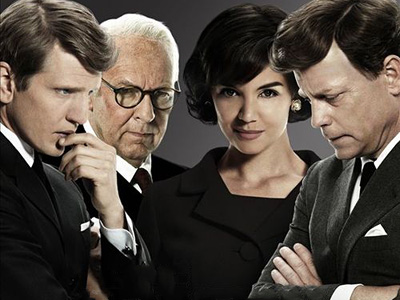 The Kennedys, a mini-series about the main players of that hagged family, is now being screened on BBC2 in the UK and, despite the fact that I saw it and bemoaned the end of it some time ago on satellite TV, it did not elicit a scintilla of response until now. Which at least shows how many people, with umpteen score channels to watch, actually only watch major drama when it is shoved under their nose on the little knot of terrestrial offerings.
The Kennedys, a mini-series about the main players of that hagged family, is now being screened on BBC2 in the UK and, despite the fact that I saw it and bemoaned the end of it some time ago on satellite TV, it did not elicit a scintilla of response until now. Which at least shows how many people, with umpteen score channels to watch, actually only watch major drama when it is shoved under their nose on the little knot of terrestrial offerings.
Based on Jack Kennedy's life but labelled as fiction, the series has been roundly criticised. It was originally scheduled to run on the US channel History but was cancelled earlier this year. In a statement executives said such dramatic interpretation was not "the right fit" for the channel.
In the end it was shown on cable station ReelzChannel, where it was probably seen by two men and their dog. Ironically, it's probably now getting more attention in the US because it is on BBC2 – the Americans love British TV and count it as quality – which should give them a clue as to the nature of The Kennedys.
So why all the fuss? Well, this is America's Camelot we are dealing with here; only a drama about 9/11 would be more touchy. It is also a fictionalised account and so, for some, is a "political character assassination". It is not unlike The Tudors, which elicited the same response.
I loved The Tudors, if only for the creators' unsubtle attempts at appealing to the textspeak generation (who could use some historical input to their lives) with L'Oreal-haired Tudor aristos and a Henry VIII who managed to look like a cologne ad right to the end.
But what kept me watching was that the historical underpinning it was absolutely spot-on.
Some historical non-fiction writers don't like historical fiction and have said so, quite blatantly. Anthony Beevor thinks HF writers should change the name of the historical characters we write about, so that Sharpe's Waterloo should have been fought between, say, the Emperor Bonappetit and the Duke of Barbour. Niall Ferguson has announced grandly that he will never stoop to it – while offering 'speculative fiction' in his book about the politics and economics of WWI.
They think historical fiction pollutes the clear, crystal waters of fact – but the truth is that all historical writing is fiction, from the moment the word hits the page. As the Emperor Bonappetit made clear, the bulletin from the battlefield is often the best fiction around. Julius Caesar would agree: his history of Gaul is hardly even-handed, but it gospel for historical writers on the period. We know how brave Normans struggled against English axemen at the Battle of Hastings in 1066, and how King Harold died on Senlac Hill with an arrow in his eye, because it is all recorded on the Bayeux Tapestry. Or we think we do.
We know every inch of Bannockburn, that great Scottish victory which has been written, re-written, studied and commented on for 700 years. Or we think we do.
In the end, all that is known for certain about the battle is that a Scots army under Robert Bruce met an English army under Edward II somewhere in the vicinity of Stirling, near a hamlet called Bannockburn. In fact, you can still build entire housing schemes over Bannockburn because the area is not protected. Why? Because no-one can actually pinpoint the battlefield and stick a "no developers" sign up.
Modern communication is no help – the American Civil War was the first photographed war, Vietnam was the first televised war; but the tone simply picked up where the writers left off. For every graphic, true image you have a cynically staged one. For every truth there is propaganda and, if you doubt it, look at the news from Libya.
History is a lie, written by the victors and the self-interested.
The Duke of Wellington (sorry, Barbour) ruined one poor man's life, after he had devoted time, effort and love to create a perfect diorama of Waterloo. He wanted the Duke's seal of approval so he could put it on show – and the Duke wanted the Prussians removed entirely.
But you can leave it to the Emperor Bonappetit to sum up the core of historical fiction – or even historical writing. Of those bulletins from the battlefield to the people of Paris he announced: "It is charlatanism – but of the highest sort."
Or did he?
For more debates on this and related subjects, go to the Historical Writers' Association forum, where authors of history – fiction and non-fiction – love to talk.
![]()
Was Stirling skull really a woman warrior?
Putting flesh on the bones can be as much advertising as archaeology… so do Historic Scotland have any basis for latest identification of castle bones?
1 June 2011
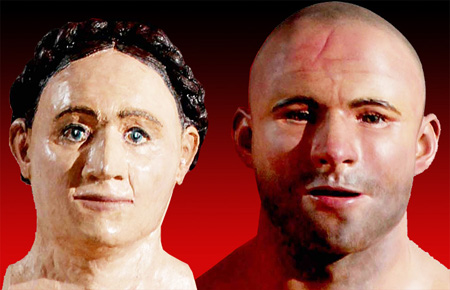 Last year BBC2’s History Cold Case series included a detailed forensic examination of bones uncovered in Stirling Castle. Dated to the mid-14th century, they showed a tough male, much scarred and violently handled; and they managed to recreate how he looked, as they always do in these programmes. Nor did they stop at the head, but were so struck by his implied musculature that they did a 3D computer idea of his whole body. He looked like a solid prop forward for a rugby sevens team.
Last year BBC2’s History Cold Case series included a detailed forensic examination of bones uncovered in Stirling Castle. Dated to the mid-14th century, they showed a tough male, much scarred and violently handled; and they managed to recreate how he looked, as they always do in these programmes. Nor did they stop at the head, but were so struck by his implied musculature that they did a 3D computer idea of his whole body. He looked like a solid prop forward for a rugby sevens team.
The programme wrongly identified him, but later analysis confidently names him as Sir John de Strickeley, or Stricheley, an English knight killed in the siege of 1341. Stirling Castle was held by the English then (again).
Now Historic Scotland, who dug up the bones, have announced that his companion, buried with him under the floor of a lost royal chapel, was a woman, equally formidably muscled; and who died, it seems, from the weel-kent fallback of Taggart episodes – blunt trauma to the head. The experts have concluded she was smacked with a warhammer, almost certainly one with a nasty pick on one side, because her skull has the neat little hole made by it. They even have a candidate for the weapon.
She died between the ages of 36 and 45, but that doesn’t make her a ‘young woman’. She was a mature woman, reaching the end of her life. Medieval females, noble or not, rarely lived longer than 45 or 50 unless they were upper-echelon noble. They were married at 12, birthed their first baby at 13 or 14 and were old, if they were lucky enough to survive childbirth at all, by 36. Of course, loads of women lived longer lives, just as folk defy the statistics even today – porridge and a dram a day has been known to do that.
The unnamed bones could be the remains of a woman warrior, the experts decided, who might well have stood shoulder to shoulder with Wallace or Bruce, since she lived around that time. Such excitement will help sell tickets to the new-look, expensively refurbished Stirling Castle. But Historic Scotland can be allowed, on this occasion, to get all lathered about the idea of a Keira Knightley of the 14th century, all armour and fancy swordwork – because it’s not complete bollocks.
Women almost certainly fought with Wallace. His army was composed of brigands, outlaws and the general trash of medieval Scotland – hard though it is for patriots to believe that. When these hard-hearted, cold-eyed killers, robbers and rapists joined with the army from the north, under Moray, they found more of a proper medieval army, composed of burghers with armour, weapons and a degree of discipline and expertise.
There were – as was proved at Bannockburn – a solid wake of camp followers, mainly women who foraged, washed, cleaned and provided other services for their men, or any men who could pay. During any of the running fights Wallace was involved in, I would not be surprised to find shrieking harridans with fistfuls of knives and a bad attitude. During the likes of the larger affairs, of Stirling Brig, Falkirk and Bannockburn, I would not be surprised in the least to find them skulking on the fringes of the fighting, slitting throats and grabbing whatever they could from the dead or those too wounded to care. Nor would they restrict themselves to the enemy.
But let’s also not forget that this era was not the Rennaissance Fair fantasy portrayed in many a song and story, where women sat in high towers wearing pointy hats with floaty veils and did embroidery.
Isabel, Countess of Buchan, was famous for defying her husband in favour of his arch-enemy, a certain Robert Bruce. The price she paid for crowning him king was harsh – Edward, Hammer of the Scots, stuck her in a cage slung off the walls of Berwick until she either died or got too sick to hang there. Her husband, presumably, agreed without demure.
Later, when the Wars of Independence ground inexorably past the death of Bruce, a certain Agnes Randolph, Countess of Dunbar, defended her husband’s castle against his English enemies. At one point, the story goes, the enemy captured her brother, the Earl of Moray, and threatened to hang him if she did not give in. She told them to go ahead because that way she would inherit his lands as well.
They did not call her Black Agnes because she could sew the shit out a silk cushion.
So here’s a salute to the rickle of bones uncovered underneath Stirling’s royal chapel. She has served her purpose, as most of the medieval heroines of Scottish history served their purpose – unknown, unsung and absolutely pivotal.